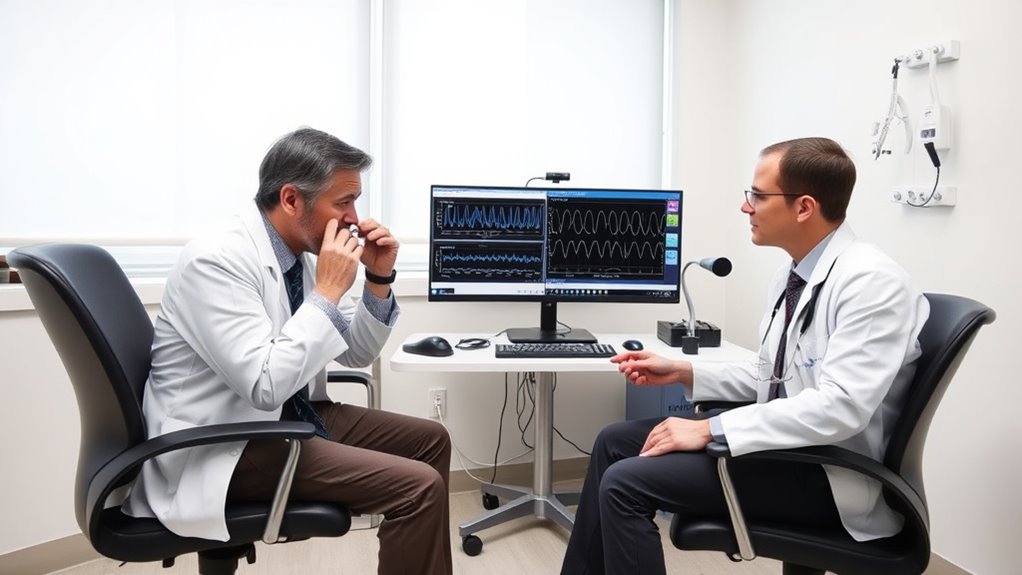An ENT specialist handles complex ear conditions, performing detailed exams, diagnosing structural issues, and offering surgical or medical treatments. An audiologist focuses on evaluating hearing and balance, conducting tests to identify hearing loss and fitting hearing aids. Both professionals play vital roles in your diagnosis; ENTs handle medical and surgical concerns, while audiologists address functional hearing issues. For an all-encompassing understanding of your ear health, knowing how each role contributes is essential—continue exploring to learn more.
Key Takeaways
- ENTs diagnose and treat complex ear conditions, performing surgeries and prescribing medications, while audiologists focus on hearing assessments and device management.
- ENTs conduct detailed medical evaluations and physical exams, whereas audiologists specialize in hearing and balance testing.
- For structural or medical ear issues, an ENT is the appropriate first contact; for hearing loss, an audiologist provides specialized testing.
- Both professionals collaborate to ensure comprehensive diagnosis and personalized treatment plans for ear health.
- Understanding their distinct roles helps patients seek timely, appropriate care for various ear-related concerns.

When it comes to diagnosing ear-related issues, understanding the distinct roles of ENT specialists and audiologists is essential. If you’re experiencing symptoms like ear pain, dizziness, or hearing difficulties, knowing who to see can make a significant difference in your treatment. ENT specialists, or otolaryngologists, are medical doctors trained to handle complex ear conditions, including ear infections, chronic eardrum problems, and structural abnormalities. They can perform detailed exams, prescribe medications, and even recommend surgery if needed. When you visit an ENT, they’ll typically start with a detailed medical history and a physical examination of your ears, nose, and throat. They might use specialized tools like an otoscope to look deep into your ear canal or conduct tests such as audiometry to evaluate your hearing. If you have recurring ear infections or suspect a more serious problem, an ENT’s expertise becomes essential, as they can diagnose and treat issues that go beyond basic hearing concerns. Additionally, ENT specialists are trained to identify structural abnormalities, which can be crucial for comprehensive diagnosis and treatment planning.
On the other hand, audiologists focus primarily on evaluating and managing hearing and balance problems. They are trained professionals who conduct hearing assessments—tests that measure how well you hear different sounds, speech, and frequencies. These assessments help identify the degree and type of hearing loss, which is pivotal for determining the most effective treatment plan. If you’re noticing difficulty understanding conversations, experiencing tinnitus, or suspecting hearing loss from age or noise exposure, an audiologist can perform detailed evaluations to pinpoint the issue. They also fit and manage hearing aids, cochlear implants, and other assistive devices to improve your hearing. While audiologists do not prescribe medications or perform surgeries, their expertise in hearing assessments guarantees you get accurate diagnoses and appropriate interventions.
In many cases, your journey begins with an ENT if symptoms are severe or suggest structural problems, and then shifts to an audiologist for precise hearing testing and management. Conversely, if your primary concern is hearing loss without other significant symptoms, seeing an audiologist first might be the best approach. Both professionals play complementary roles—ENTs handle diagnosis and treatment of physical or medical conditions, while audiologists focus on the functional aspect of hearing and balance. Understanding these distinctions helps you seek the right care at the right time, guaranteeing a more effective and detailed diagnosis of ear-related issues.
Frequently Asked Questions
Can Audiologists Perform Surgical Procedures?
You might wonder if audiologists can perform surgical procedures. Generally, they don’t have the surgical expertise or training needed for operative interventions, as their scope focuses on testing and rehabilitating hearing. Surgical procedures require specialized skills and medical training that are within the role of ENT specialists. So, while audiologists play a vital role in diagnosis and management, performing surgeries isn’t part of their procedure scope.
How Do ENT Specialists Collaborate With Audiologists?
You see, ENT specialists and audiologists collaborate through interdisciplinary teamwork, ensuring thorough patient care. They follow established communication protocols to share findings and coordinate treatments effectively. This partnership allows you to benefit from detailed assessments and tailored interventions. By working together, they optimize diagnostic accuracy and treatment plans, making sure all aspects of your ear, nose, and throat health are addressed seamlessly for better outcomes.
Are There Specific Cases Only ENT Doctors Can Diagnose?
Think of your ear health like a vast ocean, with ENT specialists steering its depths and audiologists charting its surface. You might ask if there are areas only ENT doctors can explore. Yes, they handle the ENT scope—diagnosing structural issues, infections, or tumors—that go beyond audiology limits. These are complex cases requiring their specialized training, ensuring you get exhaustive care where it’s most needed.
What Advanced Diagnostic Tools Do Audiologists Use?
You’ll find that audiologists use advanced diagnostic tools like detailed hearing assessments and otoacoustic emissions testing. These tools help evaluate your hearing health accurately, identifying issues like cochlear function or early hearing loss. By performing these assessments, audiologists can pinpoint specific problems, guiding effective treatment plans. Their expertise in these advanced diagnostics ensures you receive thorough evaluations, complementing other medical assessments when necessary.
How Is Patient Care Coordinated Between ENT and Audiology?
Patient care progresses smoothly through a multidisciplinary approach, where ENT specialists and audiologists collaborate closely. You’ll find that they share information, streamline strategies, and support your specific needs. This partnership enhances patient management by ensuring precise diagnoses and personalized treatment plans. Together, they coordinate care, communicate effectively, and cover all aspects of your hearing health, making sure you get thorough, continuous support throughout your journey to better hearing.
Conclusion
In the end, both ENT specialists and audiologists play essential roles in your diagnosis process. You rely on the ENT for medical insights and treatment options, while the audiologist helps identify hearing issues through specialized testing. Together, they provide an all-encompassing view of your health. So, isn’t it reassuring to know that by working with both, you’re ensuring the most accurate diagnosis and effective care possible? After all, isn’t your health worth the best teamwork?










